Gun Violence Seen Through the Eyes of Children
‘I want it to stop’
At 15, Ruben Urbina couldn’t bear his depression and anxiety anymore. So he called police with a chilling threat.
By John Woodrow Cox, Originally published by The Washington Post on December 27, 2017
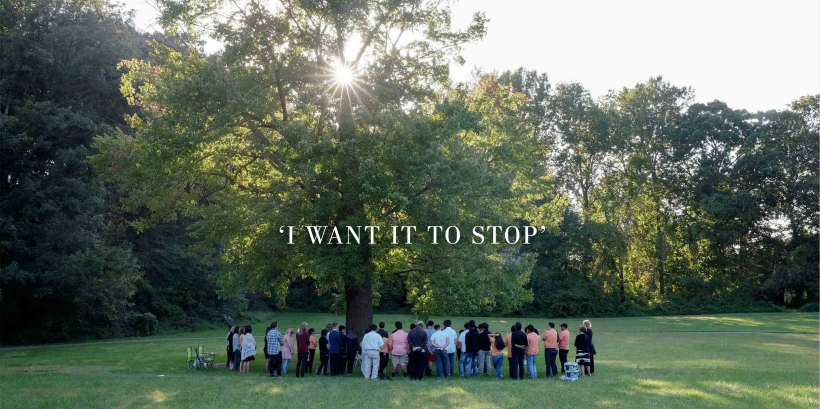
“I don’t know whether I should thank you or hate you for getting my brother,” wrote Ruben Urbina, a floppy-haired honor-roll student who, at 15, was so slight that he looked more like a middle-schooler.
The night before, on Sept. 14, Ruben had attempted to hang himself, and now he was trying to describe it to Jessica.
“I’m just more worried about the experience I felt before I was about to pass out,” he continued. “I never felt anything like that. I was in the most panicked state ever.”
Ruben Urbina.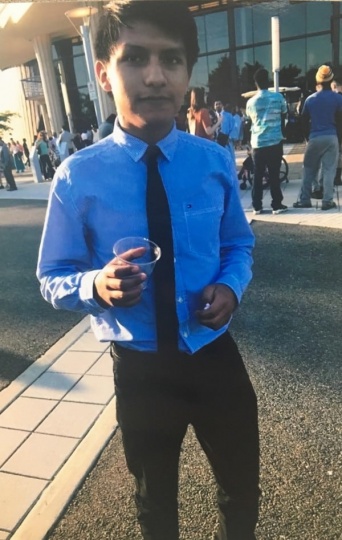
Ruben, a sophomore, had especially struggled in the three weeks since their return to school from summer break. Jessica, a junior, spotted cuts on his arm and confronted him, but he wouldn’t talk about it.
Right before he tried to hang himself, they had a fight and he lashed out, insisting in a series of texts that he didn’t want to see her anymore. Amid the anger, though, he also voiced his despair.
“I’ve had all these thoughts pile up in my head now that I can’t even think anymore,” Ruben wrote. “I want it to stop.”
“Are you okay?” responded Jessica, 16, because she knew where those thoughts could take him. He had nearly ended his own life with pills several weeks earlier.
“Don’t do anything stupid.”
She sent him a silly meme of a fat guy sitting on a bench next to the title “Breaking Benches,” a play on the TV show “Breaking Bad.” She’d used it before to make him feel better when he needed it most, but this time, it didn’t work.
“I’m just glad I finally have the balls to kill myself,” he wrote. “See ya :).”
“Yo wtf,” she responded, before texting his older brother, Oscar, that Ruben needed help. She messaged Oscar’s girlfriend, too.
“Stop him. Call the cops for endangerment of himself or something,” Jessica wrote her. “Just don’t let him kill himself.”
Ruben’s 18-year-old sibling rushed home and sprinted upstairs, screaming and slamming on his brother’s locked door until the boy opened it, crying. Oscar, whose girlfriend assured Jessica that they’d made it in time, couldn’t find whatever Ruben had strung around his throat.
“I’m too scared to experience that again,” Ruben texted Jessica the next morning.
“What all happened,” she responded as she got ready for school and headed to the bus.
“I’m not going to talk about it now.”
“Okay.”
“Why couldn’t you just do nothing about it,” he asked.
“Because I’m a human being and I have sympathy.”
“It doesn’t matter,” he continued. “I’ll try again some other day.”
She was still mad at him for the hurtful things he’d messaged the night before, and she told him so.
“I’m not sure if I should get some serious help or if I should leave it be,” he texted.
“Get help,” she pleaded.
“I just have a f---ed up brain.”
He apologized.
“I don’t know how to explain what happened. Can we please talk after school,” wrote Ruben, who had decided to skip that day.
“Sure.”
Jessica Newburn, Ruben’s 16-year-old best friend, in her bedroom in Haymarket.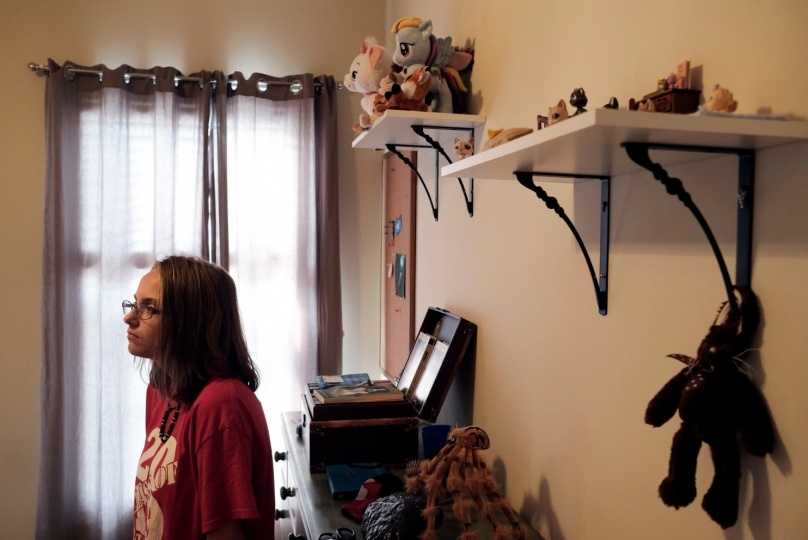
Her bus pulled up at PACE and she told him goodbye, then turned her phone off.
She understood his suffering because Jessica — who, with her father’s permission, talked about her relationship with Ruben and shared hundreds of their texts with The Washington Post — had already endured what she hoped was her worst moment. The teen had once spent three days in a hospital after slicing open her thighs and swallowing more than 40 Benadryl, but she’d come a long way since then, proof in her mind that Ruben could, too.
“I’ve gotten better,” she would tell him. “You can get better.”
And Jessica would tell him again that afternoon, she thought. When either of them felt sad or overwhelmed or just bored, the friends would take walks together, often to a favorite spot in the woods of suburban Haymarket, where they’d sit on a bench and stare out across a pond. So, Jessica figured, they’d go on another one of their walks after school, make each other laugh. He’d call her Jess, she’d call him Wooben, and they’d fall back into their version of normal.
But at the end of the day, when her bus pulled into their neighborhood, she saw police cars lining the streets.
Her father and stepmother were waiting in their SUV.
“Daddy, what’s going on?” Jessica asked.
An officer, he told her, had shot someone at Ruben’s home.
At first, they thought it was his older brother, but when she called Ruben’s phone, he didn’t answer. When she texted that she was sorry, he didn’t respond.
It was then that Jessica noticed the messages he’d sent her earlier, when she’d been at school with her phone turned off.
In one: “I’m just some kid who has major depression disorder and severe anxiety who’s probably bipolar too.”
And after that: “Just look at the people that do stupid s--- like me and don’t follow in their footsteps.”
And finally: “Emotions are only temporary. Don’t let it take over you like it did to me.”
An hour later, Jessica heard something on TV that she didn’t want to believe.
“The news is saying a 15 year old was shot and killed,” she messaged her best friend. “Please don’t be you. Please.”
Photographs and mementos of Ruben at his home. 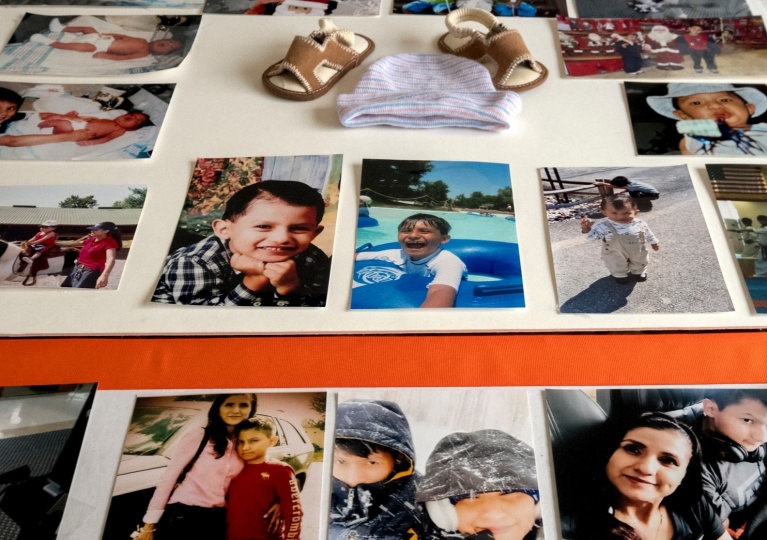
Just before 11 that morning of Sept. 15, Oscar had woken up to his mother’s screams.
Ruben was outside, she said. He had a knife.
By then, he’d already dialed 911.
Calmly, police said, Ruben told the Prince William County operator that he had a bomb strapped to his chest, even though he didn’t. He insisted he was holding his mother hostage, even though he wasn’t. He warned he had blades and suggested he might get a gun, even though he couldn’t.
He claimed, investigators said, that “he did not want to live anymore.”
Then he hung up.
Moments later, Oscar and his girlfriend found Ruben in the garage, wielding a three-foot-long crowbar.
“I called the police,” Ruben said, “so they can kill me.”
The ligature marks on his neck from the night before were still raw.
Police cars line the streets in Ruben’s townhouse community.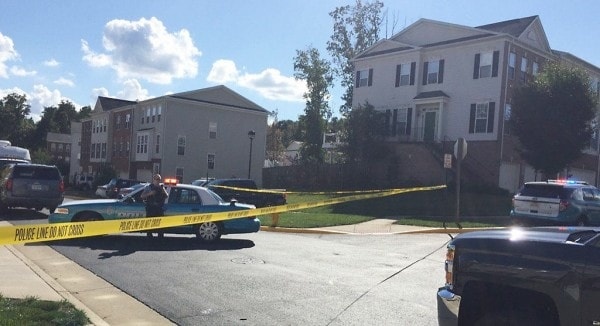
Both boys, the family said in interviews, had long contended with suicidal thoughts, undergoing years of therapy and taking antidepressants. It was Oscar, though, who had always been the violent one, getting into bloody fights, even serving time in jail. Ruben had once been hospitalized after trying to overdose on Zoloft, but he was never aggressive. Intensely shy at times, he liked to skateboard and play video games, study the history of the Soviet Union and read the work of astrophysicist Neil deGrasse Tyson. He made A’s and B’s. He wanted to become a graphic designer when he grew up.
Oscar could see little of that gentle kid in the dark, anguished eyes of the boy standing before him. He considered tackling Ruben, just 5-foot-2 and 120 pounds, but his brother threatened him with the crowbar.
“Get away from me,” he told Oscar and his girlfriend.
Ruben moved outside, in front of their home, just as police drew near. At 10:58 a.m., two officers parked down the street, aware of the bomb threat. It was a balmy 75 degrees, but Ruben still wore a heavy gray North Face jacket, making it hard to tell whether he’d concealed something inside.
Oscar ran toward the police, trying to intervene, but they told him to back away.
Just then, Ruben swung the crowbar at Oscar’s girlfriend, striking her on the back. He turned and headed toward the officers, passing an American flag mounted beside the family’s front door.
Ruben, still 10 months shy of being eligible for a driver’s license, raised the crowbar with both hands, according to police. They said one of the officers ordered him to drop it. He told him to stop.
Ruben kept coming.
The officer fired two rounds, and the teenager collapsed.
From left, Oscar Urbina, his older son, Oscar, and his wife, Rosaura, grieve during services for Ruben at a Northern Virginia cemetery in September. 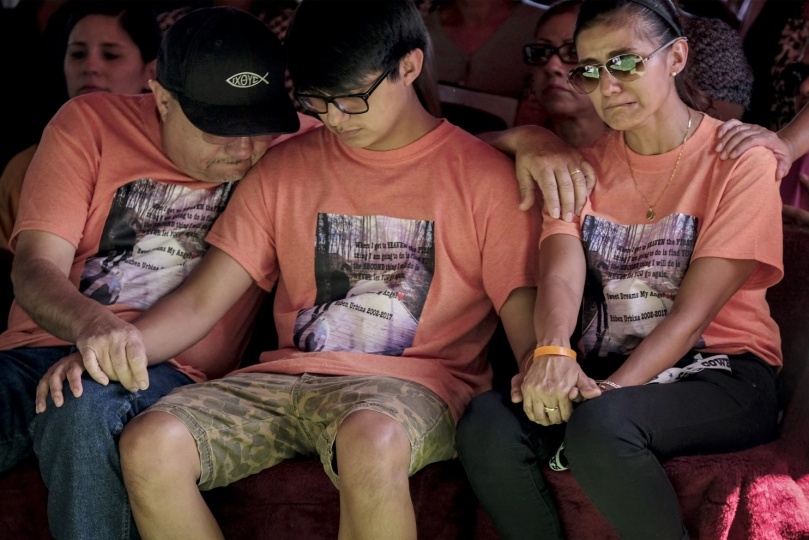
The mourners filed toward the funeral home’s white double doors, some of them in black suits or dresses and others in orange T-shirts, because that was Ruben’s favorite color.
As they passed, a woman handed out copies of an open letter that Ruben’s father, Oscar Urbina, had written to Officer Robert Choyce, the seven-year veteran of the police force who shot his son.
“A Letter Of Forgiveness,” it was titled, but most of what came next was laced with fury.
“Regardless of the circumstances surrounding my child death....he didn’t do anything wrong...you did,” wrote Urbina, who’d been traveling when Ruben was killed. “The difference between you and us is that...you are GUILTY. Our baby is innocent.”
Urbina contended that the officer, who didn’t respond to a request for comment, should have used a Taser or pepper spray to stop Ruben. His older boy, Oscar, agreed, but he also believed the encounter ended exactly the way his brother intended it to.
Already, Prince William County Commonwealth’s Attorney Paul B. Ebert had concluded the shooting was justified because, he said, Ruben “was ready, willing and able to inflict death or serious bodily harm upon the responding officers.” Ebert said he considered it a classic “suicide by cop,” the only one involving a juvenile he could remember in his 52-year career as a prosecutor.
“You wouldn’t think a young person would want to commit suicide by cop,” Ebert said. “He had to be thoughtful, extremely premeditated.”
Ruben’s death wasn’t officially counted as a suicide, because he didn’t pull the trigger, but its unusual and public nature drew national headlines — and rare attention to one teenager’s apparent effort to end his own life.
On average, one child under the age of 18 committed suicide every six hours last year, according to a Post review of new data released Dec. 21 by the Centers for Disease Control and Prevention.
Nearly half of those children died from hanging, strangulation or suffocation, while 41 percent used guns. The total number — 1,533 — was the largest in at least a decade, nearly doubling over that period.
Seven of them were 9 years old.
Those who study youth suicide, and seek to curb its continued surge, focus on prevention. Evidence shows, according to the CDC, that teenagers are more likely to act on impulse if they have quick access to “lethal means,” particularly powerful drugs or loaded firearms. Just as important, experts say, is effectively treating kids’ underlying mental illness, and it was this point that had lingered in the mind of Ruben’s mother, Rosaura Urbina, after he was killed. Her son had already tried and failed to overdose and to hang himself, and they didn’t have a gun in their home. But Ruben, she realized, had devised a different way to access lethal means.
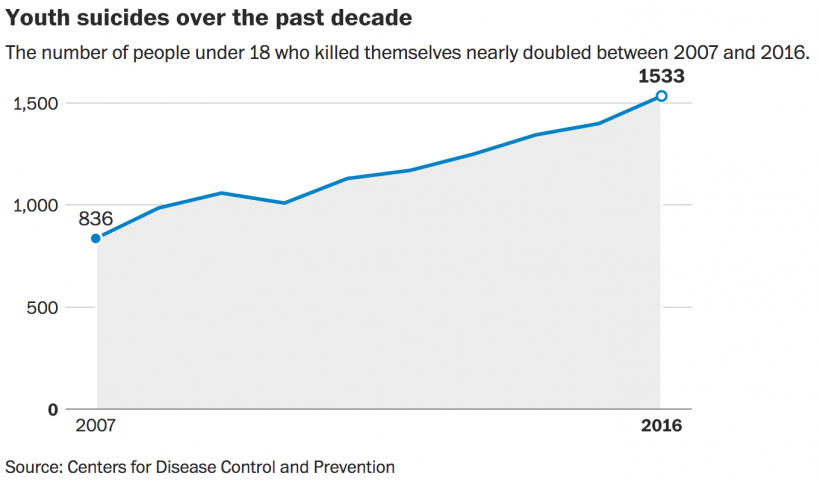
She believed the officer used unnecessary force, but Rosaura also couldn’t grasp what made “my beloved Ruben,” as she called him in Spanish at the funeral, want to die. Decades ago, she and her husband had both immigrated to this country from Mexico. They’d each come with nothing, but the couple, now U.S. citizens, said they’d done the best they could for their troubled American-born teens. Oscar, 55, worked as a Verizon technician and Rosaura, 43, as a McDonald’s manager, and together, they saved enough money to move from a mobile home in Fairfax County to their own neatly furnished, three-bedroom townhouse in Haymarket.
After Ruben’s killing, though, Rosaura couldn’t help but question the choices they’d made.
He had never showed signs of depression before the move, so what if they had never left? What if they’d let him stop taking his antipsychotic medication after he’d complained that it disrupted his moods? Were his exemplary grades a false indicator that his mind had finally quieted? Should they have taken him to the hospital that night, after he tried to hang himself, instead of waiting?
She’d woken up early the next morning and called Ruben’s psychiatrist for guidance. Someone in the doctor’s office said they couldn’t get her son in that day, so she should take him to the emergency room.
And that was her plan, even after Ruben had come downstairs and shared fried eggs and bacon with her.
“Are you okay?” she’d asked.
“I’m fine,” he’d said.
Minutes later, after he got the knife, she learned that he’d called the police. Rosaura was relieved. They would calm him down, she thought. With the officers en route, and her older son trying to comfort Ruben in the garage, she dashed back inside to get ready to take him to the hospital.
Then, as Rosaura changed clothes in her bedroom, she heard two pops.
A police spokesman declined to discuss what Rosaura said happened next, when she ran outside to find Ruben dead on the ground. She asked Choyce why he’d shot her son, and this, she recalled, was the officer’s response: “Because he asked me for it.”
Jessica hangs out at a neighborhood playground in Haymarket after Ruben’s death. 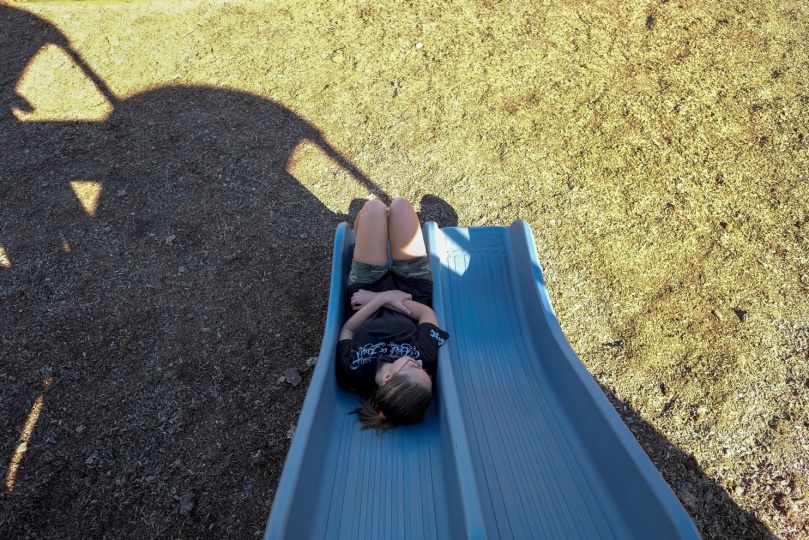
Jessica stood in the shade of a tall granite slab, just behind a maroon tent where dozens of people had crowded around Ruben’s urn at the cemetery.
She clutched a box of tissues in her hands, and from a string around her neck hung a beaded bracelet Ruben had brought her back from his summer trip to Mexico. She dressed in an orange T-shirt, for him, and on her left wrist she wore an orange band.
“We are Ruben,” read an inscription along the outside. When a teacher had given it to her at school that morning, Jessica sunk to the hallway floor and wept.
Amid the swell of grief, guilt had also begun to flicker in her mind. Jessica knew Ruben had a crush on her, and the teen wondered if maybe she could have said something to him that would have changed the course he took. But she knew, too, that there wasn’t always an answer — that sometimes people her age, or any age, wanted to die for inexplicable reasons.
Jessica never could articulate why she’d attempted suicide that one night in eighth grade, or why she’d felt so unhappy in the months before it. Her life was great, she said. She had friends, loving parents, good grades, but none of it seemed to matter at the time.
Only after weathering months of failed group therapy and ineffective medications, damaging misdiagnoses and an unaccommodating insurer, did she at last begin to find a sense of calm. The move in ninth grade to PACE, with its small classrooms and patient approach, had also helped.
And so had Ruben.
He knew how to soothe her when she had panic attacks. It’s just in your head, he would say until she believed him.
He also knew how to make her laugh, especially the time he posted a picture of himself on Instagram, posing just like a female friend of theirs always did, eyes closed, head cocked, hand beneath his chin, a crown of digital flowers wrapped around his head.
He tried, repeatedly, to teach her how to play one of his favorite video games, “Call of Duty,” so they could enjoy it together.
“There’s so many buttons on the controller,” she’d complain.
Most of all, Jessica cherished their walks — the one when, after a rainstorm, he gave her a piggyback ride through the mud and nearly dropped her; and after that, when they came upon a big black snake and she screamed, and he thought it was hilarious; and in June, when they found a baby bird on the ground and brought it back, warmed it with a heating pad and fed it mushy dog treats, then took it to a wildlife center and ended their perfect day with burritos from Moe’s Southwest Grill.
Even after she knew Ruben was dead, Jessica texted his number.
She messaged once that she was releasing an orange balloon into the sky for him. Later, she sent a collection of his favorite emoji: a taco, a hammer and sickle, an Easter Island head.
“I miss you,” she wrote. “I wish you were here.”
Jessica shows the final text messages she sent Ruben before, and after, he was shot. 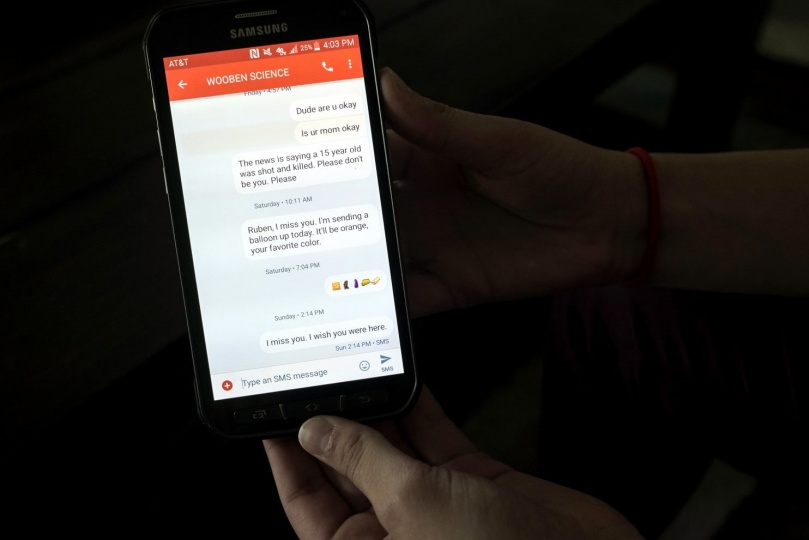
One after another, the local TV reporters had knocked at the Urbina family’s front door, asking for comment, so again and again Ruben’s father went outside and gave them one.
“We just don’t know how we’re going to survive this,” he said.
“My kid was taken from us for no reason at all,” he said.
Urbina still didn’t know the precise details, because he couldn’t stand to hear them, but he remained convinced that his son should still be alive.
In their living room, he and 18-year-old Oscar talked of how it had come to this.
“You and I know the medicine is not an issue,” Urbina said, referring to Ruben’s antipsychotics.
“The thing is, I don’t know that,” Oscar said.
His father couldn’t be swayed.
“It’s irrelevant whether he was in a state of mind,” Urbina said, arguing that the officer should have simply subdued Ruben. The teen, he believed, was too small to pose a real threat.
For Oscar, the answer wasn’t that simple.
“I can’t help but, you know, try to find someone to blame,” he said. “Should I blame me? Should I blame my parents? Should I blame the officer? I don’t know who, because I just feel like so many things went wrong that we could have done better.”
He struggled to understand what had incited Ruben that morning, most of all because his younger brother had sent him a funny video game meme of Mario’s head atop a futuristic warrior’s body just 81 minutes before the shooting.
Oscar told his dad he knew the family didn’t want to focus on Ruben’s depression.
“That’s not the issue,” Urbina said.
“But you have to realize, that is the issue, because that’s why that happened.”
“No, the issue is the decision that the guy made,” Urbina said of the officer.
Left: Oscar Urbina grieves for his younger son, Ruben. He and others wore orange T-shirts because that was Ruben’s favorite color; Right: Jessica and Ruben’s brother, Oscar, 18, embrace during a memorial for Ruben. 
Something good, though, needed to come from Ruben’s death, his brother maintained. People needed to pay more attention to kids struggling with mental illness, and maybe this would help.
“Although somebody may seem like they’re doing good — I know you don’t want it to be about that,” Oscar said, “but no matter how good they may —.”
“It’s totally irrelevant,” his dad interjected. “Because whatever the case, we were — he had the help.”
“I know he had the help, but no matter how much help, how many rehabs have I — how many places have I been?”
“I know —,” Urbina began. Oscar cut him off.
“Let me talk. I’ve had help. I’ve been okay. Some points I’ve had where I’ve been okay for a long time,” he said, then pointed at his head. “But that doesn’t change what’s up here.”
Ruben had used almost those same words the night he’d tried to hang himself.
He couldn’t bear the anxiety anymore, Ruben told his brother. The unyielding depression.
“It’s too much.”
Ruben’s urn at a cemetery in Northern Virginia in September.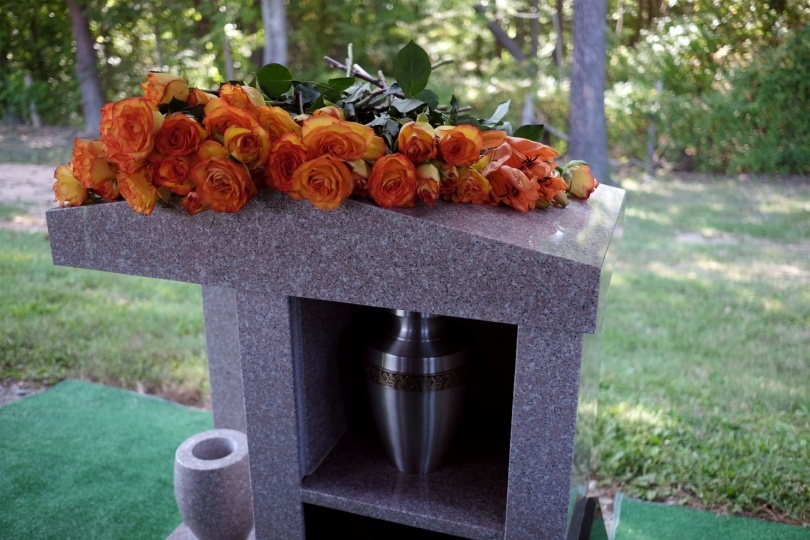
To reach the National Suicide Prevention Lifeline, call 1-800-273-TALK (8255). You can also text a crisis counselor by messaging 741741.



































































































